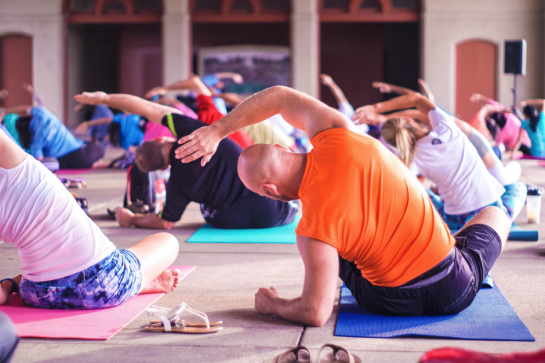
YOGA INTO BREAST CANCER REHAB OR IS IT JUST A HYPE?
Over the past decade, yoga has exploded in popularity through all age groups and thousands of new yoga studios have popped up like mushrooms across the Western world. Today, everybody knows someone who is practising yoga daily. This growing popularity can also be reflected by the number of newly published studies about yoga (Danhauer et al., 2019). Ten percent of these publications were investigated in the field of oncology and are mostly related to breast cancer patients/survivors (Danhauer et al., 2019).
In Belgium, about 1 out of 8 women develop breast cancer (Bray et al., 2018). Despite the high survival rate most of the patients are facing long-term debilitating symptoms, such as pain, fatigue, sleep disturbance, anxiety, distress (fear of recurrence) and cognitive impairments (Cramer et al., 2017). These symptoms do not always resolve on their own and that’s why a complementary therapy is recommended. Why not an alternative like yoga? Yogis claim that practising yoga provides them with a sensation of well-being and a feeling of improvement in physical and mental health. Therefore, the question becomes, can yoga reduce these symptoms that disable patients to resume their pre-diagnosis activities?
A Cochrane review found evidence for the implementation of Complex Yoga as a complementary treatment in the rehabilitation program of non-metastatic breast cancer patients and breast cancer-free patients (Cramer et al., 2017). Improvements were observed on health-related quality of life, anxiety, fatigue, sleep disorders and depression (Cramer et al., 2017). Complex yoga incorporates physical performance, breathing exercise and/or meditation. A type of yoga that combines these three aspects is Hatha yoga (Cramer et al., 2016). In addition, some evidence showed that practising Hatha yoga reduces inflammation and oxidative stress markers in the blood (Kiecolt-Glaser et al., 2014; Lim et al. 2015).
How should yoga be implemented by health caregivers? Currently, it is difficult to provide breast cancer patients/survivors with the best yoga program since there is a lack of apparent difference between yoga types (Cramer et al. 2016). Until now, some evidence has shown that including meditation is essential because it reduces depressive disorders of patients (Cramer et al. 2017). However, Hatha yoga is the type of yoga usually used in studies. Nevertheless, further evidence is needed to define the best type according to cancer symptoms and to risk of adverse events (Cramer et al. 2016). Besides, no consensus exists about the right duration, frequency and intensity of the sessions. The programs’ duration presented by the studies ranges from 4 weeks to 6 months, classes were offered 1 to 3 times a week and each class lasting from 60 to 120 minutes (Danhauer et al., 2019). Home-based practising is recommended to raise the frequency of the sessions because even if for many patients/survivors the cost is not a barrier, accessing classes might be challenging due to its popularity (Danhauer et al., 2019).
Taking everything into account, yoga is indeed a hype in our society, however we can’t overlook the beneficial effects on a considerable proportion of breast cancer debilitating symptoms. Therefore, health care providers should encourage breast cancer patients to start practicing yoga and yoga should be incorporated in the current rehabilitation programs for breast cancer patients.
Dra Astrid Lahousse
Is a fulltime junior PhD researcher and was granted an FWO PhD Fellowship fundamental research (Fund for Scientific Research-Flanders, http://www.fwo.be/en). Her research is focusing on chronic pain in breast cancer survivors. She is part of the research group ‘RERE’ and ‘Pain in Motion’.
References and further reading:
Cramer, H., Lauche, R., Klose, P., Lange, S., Langhorst, J., & Dobos, G. J. (2017). Yoga for improving health‐related quality of life, mental health and cancer‐related symptoms in women diagnosed with breast cancer. Cochrane Database of Systematic Reviews, (1).
Danhauer, S. C., Addington, E. L., Cohen, L., Sohl, S. J., Van Puymbroeck, M., Albinati, N. K., & Culos‐Reed, S. N. (2019). Yoga for symptom management in oncology: A review of the evidence base and future directions for research. Cancer, 125(12), 1979-1989.
Kiecolt-Glaser, J. K., Bennett, J. M., Andridge, R., Peng, J., Shapiro, C. L., Malarkey, W. B., ... & Glaser, R. (2014). Yoga's impact on inflammation, mood, and fatigue in breast cancer survivors: a randomized controlled trial. Journal of Clinical Oncology, 32(10), 1040.
Lim, S. A., & Cheong, K. J. (2015). Regular yoga practice improves antioxidant status, immune function, and stress hormone releases in young healthy people: a randomized, double-blind, controlled pilot study. The Journal of Alternative and Complementary Medicine, 21(9), 530-538.
Cramer, H., Lauche, R., Langhorst, J., & Dobos, G. (2016). Is one yoga style better than another? A systematic review of associations of yoga style and conclusions in randomized yoga trials. Complementary therapies in medicine, 25, 178-187
